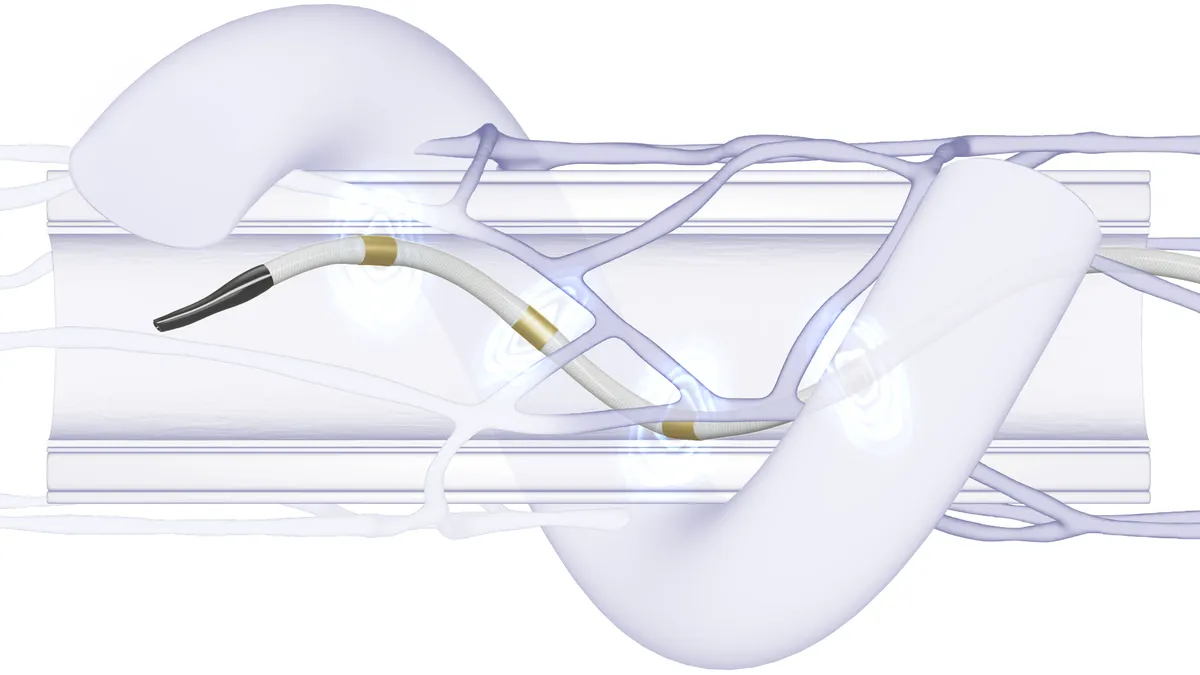Dive Brief:
- The Centers for Medicare & Medicaid Services granted transitional pass-through (TPT) payment status to Medtronic and Recor Medical for renal denervation devices to treat high blood pressure.
- The TPT program provides additional funding to hospitals to encourage use of new Food and Drug Administration-approved therapies as the CMS gathers cost data to determine future reimbursement rates under the Medicare outpatient prospective payment system. The companies announced the coverage decisions on Friday.
- Jason Weidman, president of Medtronic’s coronary and renal denervation business, called the payment approval for the Symplicity Spyral catheter an “important milestone” for the company’s renal denervation procedure because it will reduce cost barriers for healthcare systems. The company has pegged the market as a $1 billion-plus opportunity.
Dive Insight:
Medtronic and Recor, a smaller competitor and subsidiary of Otsuka Medical Devices, won FDA approval in November 2023 for their renal denervation devices as adjunctive approaches to lowering blood pressure in people who don’t respond well to medications and lifestyle changes.
Recor’s Paradise system uses ultrasound energy to ablate nerves around the renal arteries that supply blood to the kidneys, while Medtronic’s Symplicity Spyral system uses radiofrequency energy.
Questions emerged during FDA advisory panels last year about the effectiveness of renal denervation and which patients might benefit from the procedure.
Panels voted in favor of Recor’s device but against Medtronic’s device, finding the safety risks of Medtronic’s procedure outweighed the benefits. The pushback raised concerns about whether insurers would agree to pay for the treatment.
In a note to clients Monday, Citi Research analyst Joanne Wuensch said the CMS decision to give TPT payment to Medtronic “reflects another notch in management’s belt” after challenges in its clinical trials. Symplicity Spyral failed to meet the primary efficacy endpoint in its pivotal trial.
“With reimbursement in place in the intermediate-term, management’s next challenge is patient and physician education, changing the treatment paradigm from medication to intervention for drug-resistant hypertension,” Wuensch wrote.
Both Medtronic and Recor said the TPT payment will be effective for up to three years beginning Jan. 1, 2025.
The CMS created a distinct device category and code for ultrasound renal denervation that recognizes Recor’s differentiated technology, with “significant differences in comparison to other technologies available in the marketplace,” Recor CEO Lara Barghout said.
Recor’s system delivers two to three doses of ultrasound energy to the surrounding nerves, and sterile water is circulated through the balloon catheter during the procedure to help protect the renal artery wall.
“This is a major step forward in the reimbursement available for the Paradise uRDN system, creating additional financial support for hospitals and physicians to provide this novel and effective therapy to their uncontrolled hypertension patients,” said Barghout.










